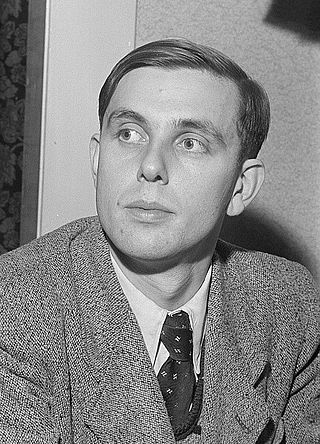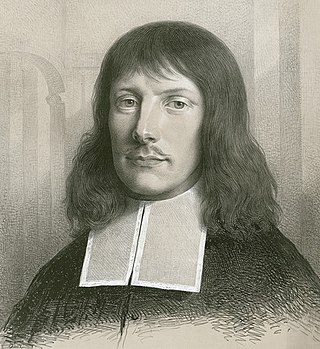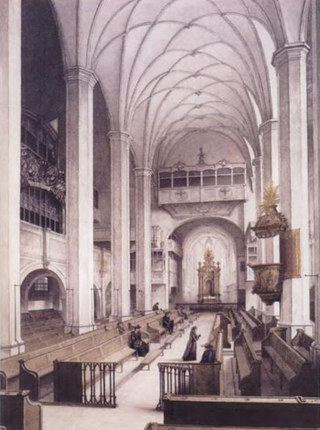Related Research Articles
As Kapellmeister at Hamburg from 1768 to 1788, Carl Philipp Emanuel Bach composed 21 settings of the Passion narrative and 1 Passion oratorio.

Jesus schläft, was soll ich hoffen?, BWV 81, is a church cantata by Johann Sebastian Bach. He composed it in 1724 in Leipzig for the fourth Sunday after Epiphany and first performed it on 30 January 1724.
Gächinger Kantorei is an internationally known German mixed choir, founded by Helmuth Rilling in 1954 in Gächingen and conducted by him until 2013, succeeded by Hans-Christoph Rademann.

Gott, man lobet dich in der Stille, BWV 120.1, is a sacred cantata by Johann Sebastian Bach. He composed it in Leipzig for the occasion of Ratswechsel, the inauguration of a new town council in a church service, probably before 1730, or, alternatively, in 1742. Parts of the cantata appeared in a wedding cantata and a cantata commemorating the Augsburg Confession in 1730. Bach reworked the choral second movement for the Symbolum Nicenum of his Mass in B minor.
James Taylor is an American tenor, known for singing the Evangelist in works of Johann Sebastian Bach.

Entfliehet, verschwindet, entweichet, ihr Sorgen, BWV 249a, is a secular cantata by Johann Sebastian Bach. First performed in 1725, the work is also known as "Shepherd Cantata" or "Shepherds' Cantata". Bach reworked the music in his Easter Oratorio.
Kurt Huber is a Swiss tenor for concert and Lieder.
Andreas Schmidt is a German classical bass-baritone in opera and concert.
Hildegard Laurich, was a German classical contralto singer.

Johann Sebastian Bach composed the church cantata Ich armer Mensch, ich Sündenknecht, BWV 55, in Leipzig for the 22nd Sunday after Trinity and first performed it on 17 November 1726.

Diethard Hellmann was a German Kantor and an academic in Leipzig, Mainz and Munich.

Nimm, was dein ist, und gehe hin, BWV 144, is a church cantata by Johann Sebastian Bach. He composed it in Leipzig for the Sunday Septuagesimae, the third Sunday before Lent, and first performed it on 6 February 1724.

Ein Herz, das seinen Jesum lebend weiß , BWV 134, is a church cantata for Easter by Johann Sebastian Bach. Bach composed the cantata for the third day of Easter in Leipzig and first performed it on 11 April 1724. He based it on his congratulatory cantata Die Zeit, die Tag und Jahre macht, BWV 134a, first performed in Köthen on 1 January 1719.

Johann Sebastian Bach composed the church cantata Lobe den Herren, den mächtigen König der Ehren, BWV 137, in Leipzig for the twelfth Sunday after Trinity and first performed it on 19 August 1725. The chorale cantata is based on the hymn by Joachim Neander (1680).

Johann Sebastian Bach composed the church cantata Christus, der ist mein Leben, BWV 95 in Leipzig for the 16th Sunday after Trinity and first performed it on 12 September 1723.

Ich lebe, mein Herze, zu deinem Ergötzen, BWV 145, is a five-movement church cantata on a libretto by Picander which Johann Sebastian Bach, as its composer, probably first performed in Leipzig on Easter Tuesday, 19 April 1729. As a seven-movement pasticcio, with one of the added movements composed by Georg Philipp Telemann, it is an Easter cantata known as So du mit deinem Munde bekennest Jesum or as Auf, mein Herz!.
Gerhard Faulstich is a German baritone.
Erich Wenk was a German bass-baritone singer in opera and especially in concert. He was a professor of voice at the Musikhochschule Köln.
Ulrike Sonntag is a German operatic soprano and academic voice teacher at the Staatliche Hochschule für Musik und Darstellende Kunst Stuttgart. She was previously a member of the Staatstheater Stuttgart, Vienna State Opera, and other ensembles, and has performed in operas and concerts, and taught masterclasses, in several countries. Among her recordings are rarely performed oratorios by Fanny Hensel and Paul Hindemith.
The Rheinische Kantorei is a German vocal ensemble of baroque music accompanied by an instrumental ensemble called Das Kleine Konzert.
References
- 1 2 Adalbert Kraus (Tenor) Bach Cantatas Website
- 1 2 Zar und Zimmermann Archived 3 March 2016 at the Wayback Machine on the operone website
- 1 2 Bach: Easter Cantatas / Rilling Archived 3 March 2016 at the Wayback Machine ArchivMusic
- 1 2 Markgräfin Wilhelmine von Bayreuth Concerto Bayreuth
- 1 2 Lukas-Passion: (1744) Georg Philipp Telemann on the website of the Stanford State University
- ↑ Adalbert Kraus: Die leuchtende Spur. Orientierung im 21. Jahrhunder LIT Verlag (in German)
- ↑ Adalbert Kraus: Ein Gott – Eine Weltreligion LIT Verlag (in German)
- ↑ J. Haydn – Die Schöpfung-Creation Archived 25 January 2010 at the Wayback Machine